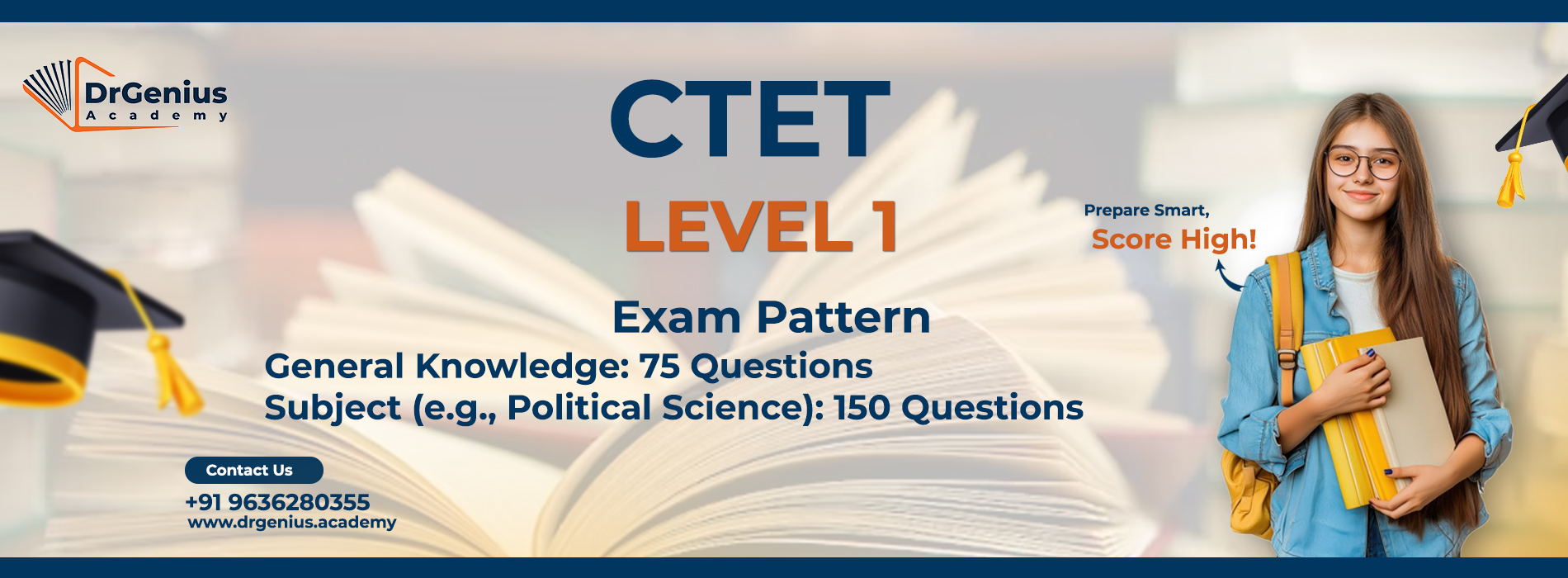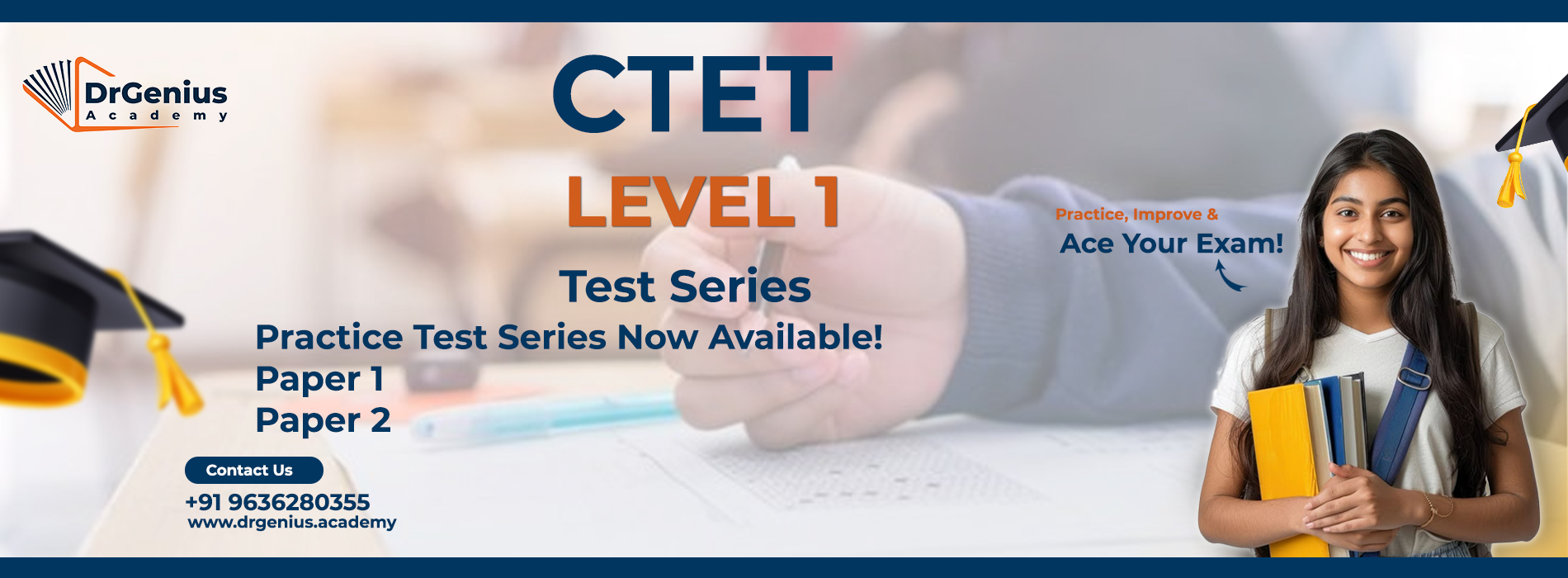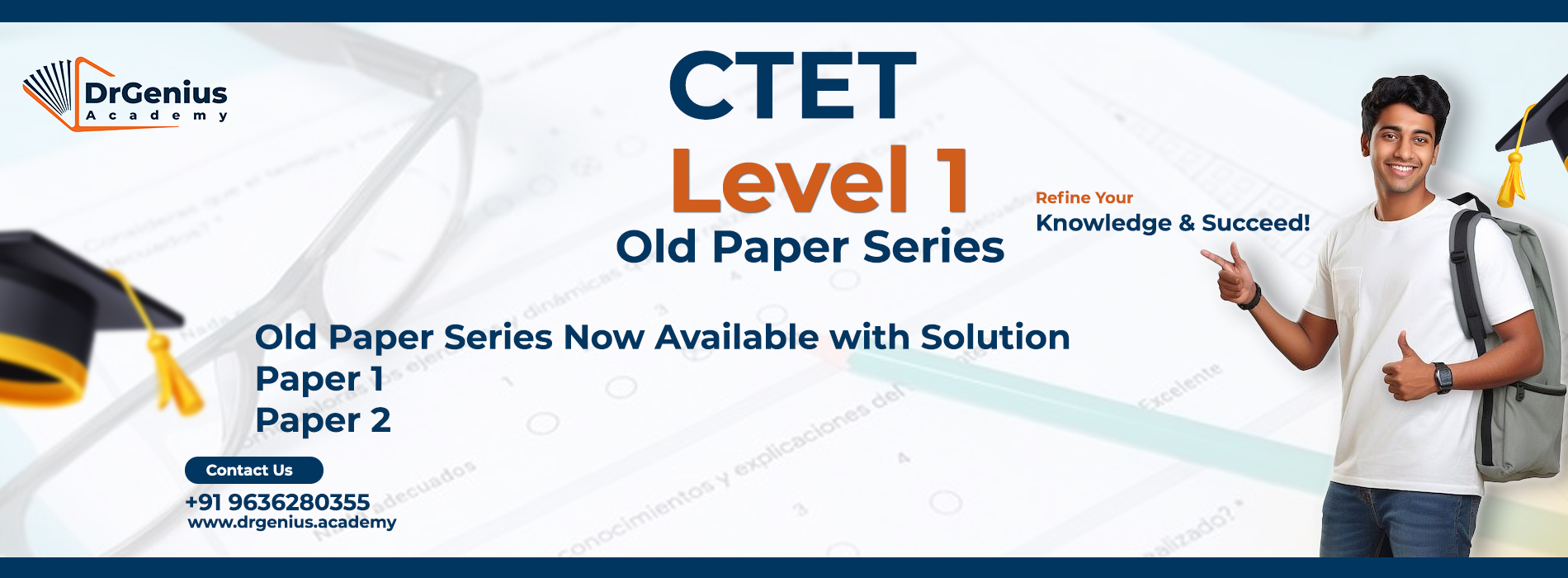CTET Paper 1 & Paper 2: Syllabus, Exam Pattern & Preparation 2025




सीटीईटी पेपर 1
- अधिसूचना
- स्कीम्स (पैटर्न)
- विषय
- पाठ्यक्रम
- पुराना पेपर
- संकाय
- कोर्स
- टेस्ट सीरीज़
- फीस संरचना
- प्रवेश पत्र
- अभ्यर्थियों के लिए निर्देश
- उत्तर कुंजी
- कट ऑफ अंक
- परिणाम
योजनाएँ (पैटर्न)
- CTET में सभी प्रश्न बहुविकल्पीय प्रश्न (MCQ) होंगे, प्रत्येक प्रश्न एक अंक का होगा और कोई नकारात्मक अंकन नहीं होगा।
पेपर I (कक्षा I से V के लिए) प्राथमिक चरण; परीक्षा की अवधि-ढाई घंटे संरचना और विषय-वस्तु
(सभी अनिवार्य)
| (i) | बाल विकास और शिक्षाशास्त्र (अनिवार्य) | 30 MCQs | 30 अंक |
| (ii) | गणित (अनिवार्य) | 30 MCQs | 30 अंक |
| (iii) | पर्यावरण अध्ययन (अनिवार्य) | 30 MCQs | 30 अंक |
| (iv) | भाषा I (अनिवार्य) | 30 MCQs | 30 अंक |
| (v) | भाषा II (अनिवार्य) | 30 MCQs | 30 अंक |
| कुल | 150 MCQs | 150 अंक |
|---|
प्रश्नों की प्रकृति और मानक:
- बाल विकास और शिक्षाशास्त्र पर परीक्षण आइटम 6-11 वर्ष की आयु समूह के लिए प्रासंगिक शिक्षण और सीखने के शैक्षिक मनोविज्ञान पर ध्यान केंद्रित करेंगे। वे विविध शिक्षार्थियों की विशेषताओं और जरूरतों, शिक्षार्थियों के साथ बातचीत और सीखने के एक अच्छे सूत्रधार की विशेषताओं और गुणों को समझने पर ध्यान केंद्रित करेंगे।
- भाषा I में टेस्ट आइटम शिक्षण माध्यम से संबंधित दक्षताओं पर ध्यान केंद्रित करेंगे।
- भाषा II में टेस्ट आइटम भाषा, संचार और समझ क्षमताओं के तत्वों पर ध्यान केंद्रित करेंगे।
- भाषा II भाषा I के अलावा एक अन्य भाषा होगी। उम्मीदवार उपलब्ध भाषा विकल्पों में से किसी एक भाषा को भाषा I और किसी अन्य को भाषा II के रूप में चुन सकता है और उसे पुष्टि पृष्ठ में इसे निर्दिष्ट करना होगा।
- दो भाषाएँ चुनें जिनमें आप CTET के लिए उपस्थित होना चाहते हैं: भाषाओं और कोड की सूची इस प्रकार है:
| भाषा | कोड संख्या | भाषा | कोड संख्या | भाषा | कोड संख्या | भाषा | कोड संख्या |
|---|---|---|---|---|---|---|---|
| अंग्रेजी | 01 | गुजराती | 06 | मराठी | 11 | संस्कृत | 16 |
| हिंदी | 02 | कन्नड़ | 07 | मिज़ो | 12 | तमिल | 17 |
| असमिया | 03 | खासी | 08 | नेपाली | 13 | तेलुगु | 18 |
| बंगाली | 04 | मलयालम | 09 | ओडिया | 14 | तिब्बती | 19 |
| गारो | 05 | मणिपुरी | 10 | पंजाबी | 15 | उर्दू | 20 |
- गणित और पर्यावरण अध्ययन में टेस्ट आइटम अवधारणाओं, समस्या समाधान क्षमताओं और शैक्षणिक समझ और विषयों के अनुप्रयोगों पर ध्यान केंद्रित करेंगे। इन सभी विषय क्षेत्रों में, टेस्ट आइटम NCERT द्वारा कक्षा I- V के लिए निर्धारित उस विषय के पाठ्यक्रम के विभिन्न प्रभागों में समान रूप से वितरित किए जाएंगे।
- पेपर I के प्रश्न कक्षा I-V के लिए एनसीईआरटी के पाठ्यक्रम में निर्धारित विषयों पर आधारित होंगे, लेकिन उनकी कठिनाई का स्तर और संबंध माध्यमिक स्तर तक हो सकते हैं।
I. Child Development and Pedagogy 30 Question
a) Child Development (Primary School Child) 15 Questions
- Concept of development and its relationship with learning
- Principles of the development of children
- Influence of Heredity& Environment
- Socialization processes: Social world & children (Teacher, Parents, Peers)
- Piaget, Kohlberg and Vygotsky: constructs and critical perspectives
- Concepts of child-centered and progressive education
- Critical perspective of the construct of Intelligence
- Multi-Dimensional Intelligence
- Language & Thought
- Gender as a social construct; gender roles,gender -bias and educational practice.
- Individual differences among learners, understanding differences based on diversity of language, caste, gender, community, religion etc.
- Distinction between Assessment for learning and assessment of learning; School-Based Assessment, Continuous & Comprehensive Evaluation: perspective and practice
- Formulating appropriate questions for assessing readiness levels of learners; for enhancing learning and critical thinking in the classroom and for assessing learner achievement.
I. बाल विकास और शिक्षाशास्त्र 30 प्रश्न
क) बाल विकास (प्राथमिक विद्यालय का बच्चा) 15 प्रश्न
- विकास की अवधारणा और सीखने के साथ इसका संबंध
- बच्चों के विकास के सिद्धांत
- आनुवंशिकता और पर्यावरण का प्रभाव
- समाजीकरण प्रक्रियाएँ: सामाजिक दुनिया और बच्चे (शिक्षक, माता-पिता, सहकर्मी)
- पियाजे, कोहलबर्ग और वायगोत्स्की: निर्माण और आलोचनात्मक दृष्टिकोण
- बाल-केंद्रित और प्रगतिशील शिक्षा की अवधारणाएँ
- बुद्धि के निर्माण का आलोचनात्मक दृष्टिकोण
- बहुआयामी बुद्धि
- भाषा और विचार
- सामाजिक निर्माण के रूप में लिंग; लिंग भूमिकाएँ, लिंग-पूर्वाग्रह और शैक्षिक अभ्यास।
- शिक्षार्थियों के बीच व्यक्तिगत अंतर, भाषा, जाति, लिंग, समुदाय, धर्म आदि की विविधता के आधार पर अंतर को समझना।
- सीखने के लिए मूल्यांकन और सीखने के मूल्यांकन के बीच अंतर; स्कूल-आधारित मूल्यांकन, सतत और व्यापक मूल्यांकन: परिप्रेक्ष्य और अभ्यास
- शिक्षार्थियों की तत्परता के स्तर का आकलन करने के लिए उपयुक्त प्रश्न तैयार करना; कक्षा में सीखने और आलोचनात्मक सोच को बढ़ाने के लिए और शिक्षार्थी की उपलब्धि का आकलन करने के लिए।
b) Concept of Inclusive education and understanding children with special needs 5 Questions
- Addressing learners from diverse back grounds including disadvantaged and deprived
- Addressing the needs of children with learning difficulties, “impairment” etc.
- Addressing the Talented, Creative, Specially baled Learners
ख) समावेशी शिक्षा की अवधारणा और विशेष जरूरतों वाले बच्चों को समझना 5 प्रश्न
- वंचित और वंचित सहित विविध पृष्ठभूमि से शिक्षार्थियों को संबोधित करना
- सीखने की कठिनाइयों, "हानि" आदि वाले बच्चों की जरूरतों को संबोधित करना।
- प्रतिभाशाली, रचनात्मक, विशेष रूप से प्रशिक्षित शिक्षार्थियों को संबोधित करना
c) Learning and Pedagogy 10 Questions
- How children think and learn; how and why children “fail” to achieve success in school performance.
- Basic processes of teaching and learning; children’s strategies of learning; learning as a social activity; social context of learning.
- Child as a problem solver and a“ scientific investigator”
- Alternative conceptions of learning in children, understanding children’s “errors” as significant steps in the learning process.
- Cognition & Emotions
- Motivation and learning
- Factors contributing to learning-personal& environmental
ग) सीखना और शिक्षणशास्त्र 10 प्रश्न
- बच्चे कैसे सोचते और सीखते हैं; बच्चे स्कूल के प्रदर्शन में सफलता प्राप्त करने में कैसे और क्यों “असफल” होते हैं।
- शिक्षण और सीखने की बुनियादी प्रक्रियाएँ; बच्चों की सीखने की रणनीतियाँ; सामाजिक गतिविधि के रूप में सीखना; सीखने का सामाजिक संदर्भ।
- समस्या समाधानकर्ता और “वैज्ञानिक अन्वेषक” के रूप में बच्चा
- बच्चों में सीखने की वैकल्पिक अवधारणाएँ, सीखने की प्रक्रिया में महत्वपूर्ण चरणों के रूप में बच्चों की “त्रुटियों” को समझना।
II Mathematics 30 Questions
a) Content 15 Questions
- Geometry
- Shapes & Spatial Understanding
- Solids around Us
- Numbers
- Addition and Subtraction
- Multiplication
- Division
- Measurement
- Weight
- Time
- Volume
- Data Handling
- Patterns
- Money
II गणित 30 प्रश्न
a) सामग्री 15 प्रश्न
- ज्यामिति
- आकृतियाँ और स्थानिक समझ
- हमारे आस-पास के ठोस पदार्थ
- संख्याएँ
- जोड़ और घटाव
- गुणा
- भाग
- माप
- वजन
- समय
- आयतन
- डेटा हैंडलिंग
- पैटर्न
- पैसा
b) Pedagogical issues 15 Questions
- Nature of Mathematics/ Logical thinking; understanding children’s thinking and reasoning patterns and strategies of making meaning and learning
- Place of Mathematics in Curriculum
- Language of Mathematics
- Community Mathematics
- Evaluation through formal and informal methods
- Problems of Teaching
- Error analysis and related aspects of learning and teaching
- Diagnostic and Remedial Teaching
b) शैक्षणिक मुद्दे 15 प्रश्न
- गणित की प्रकृति/तार्किक सोच; बच्चों की सोच और तर्क के पैटर्न और अर्थ बनाने और सीखने की रणनीतियों को समझना
- पाठ्यक्रम में गणित का स्थान
- गणित की भाषा
- सामुदायिक गणित
- औपचारिक और अनौपचारिक तरीकों से मूल्यांकन
- शिक्षण की समस्याएँ
- त्रुटि विश्लेषण और सीखने और सिखाने के संबंधित पहलू
- निदानात्मक और उपचारात्मक शिक्षण
III. Environmental Studies 30 Questions
a) Content 15 Questions
- Family and Friends:
- Relationships
- Work and Play
- Animals
- Plants
III. पर्यावरण अध्ययन 30 प्रश्न
a) विषय-वस्तु 15 प्रश्न
- परिवार और मित्र:
- रिश्ते
- काम और खेल
- जानवर
- पौधे
b) Pedagogical Issues 15 Questions
- Concept and scope of EVS
- Significance of EVS, integrated EVS
- Environmental Studies & Environmental Education
- Learning Principles
- Scope & relation to Science & Social Science
- Approaches of presenting concepts
- Activities
- Experimentation/Practical Work
- Discussion
- CCE
- Teaching material/Aids
- Problems
b) शैक्षणिक मुद्दे 15 प्रश्न
- EVS की अवधारणा और दायरा
- EVS का महत्व, एकीकृत EVS
- पर्यावरण अध्ययन और पर्यावरण शिक्षा
- सीखने के सिद्धांत
- दायरा और विज्ञान और सामाजिक विज्ञान से संबंध
- अवधारणाओं को प्रस्तुत करने के दृष्टिकोण
- गतिविधियाँ
- प्रयोग/व्यावहारिक कार्य
- चर्चा
- CCE
- शिक्षण सामग्री/सहायता
- समस्याएँ
IV. Language I 30 Questions
a) Language Comprehension 15 Questions
- Reading unseen passages - two passages one prose or drama and one poem with questions on comprehension, inference, grammar and verbal ability (Prose passage may be literary, scientific, narrative or discursive)
IV. भाषा I 30 प्रश्न
a) भाषा समझ 15 प्रश्न
- अनदेखे अंशों को पढ़ना - दो अंश, एक गद्य या नाटक और एक कविता, जिसमें समझ, अनुमान, व्याकरण और मौखिक क्षमता पर प्रश्न होंगे (गद्य अंश साहित्यिक, वैज्ञानिक, कथात्मक या विवेचनात्मक हो सकते हैं)
b) Pedagogy of Language Development 15 Questions
- Learning and acquisition
- Principles of language Teaching
- Role of listening and speaking; function of language and how children use it as a tool
- Critical perspective on the role of grammar in learning a language for communicating ideas verbally and in written form
- Challenges of teaching language in a diverse classroom; language difficulties, errors and disorders
- Language Skills
- Evaluating language comprehension and proficiency: speaking, listening, reading and writing
- Teaching-learning materials: Textbook, multi-media materials, multi lingual resource of the classroom
- Remedial Teaching
ख) भाषा विकास का शिक्षणशास्त्र 15 प्रश्न
- सीखना और अधिग्रहण
- भाषा शिक्षण के सिद्धांत
- सुनने और बोलने की भूमिका; भाषा का कार्य और बच्चे इसे एक उपकरण के रूप में कैसे उपयोग करते हैं
- मौखिक रूप से और लिखित रूप में विचारों को संप्रेषित करने के लिए भाषा सीखने में व्याकरण की भूमिका पर महत्वपूर्ण परिप्रेक्ष्य
- एक विविध कक्षा में भाषा शिक्षण की चुनौतियाँ; भाषा संबंधी कठिनाइयाँ, त्रुटियाँ और विकार
- भाषा कौशल
- भाषा की समझ और दक्षता का मूल्यांकन: बोलना, सुनना, पढ़ना और लिखना
- शिक्षण-अधिगम सामग्री: पाठ्यपुस्तक, मल्टीमीडिया सामग्री, कक्षा का बहुभाषी संसाधन
- उपचारात्मक शिक्षण
V. Language-II 30 Questions
a) Comprehension 15 Questions
- Two unseen prose passages (discursive or literary or narrative or scientific) with question on comprehension, grammar and verbal ability
b) Pedagogy of Language Development 15 Questions
- Learning and acquisition
- Principles of language Teaching
- Role of listening and speaking; function of language and how children use it as a tool
- Critical perspective on the role of grammar in learning a language for communicating ideas verbally and in written form;
- Challenges of teaching language in a diverse classroom; language difficulties, errors and disorders
- Language Skills
- Evaluating language comprehension and proficiency: speaking, listening, reading and writing
- Teaching - learning materials: Textbook, multi-media materials, multilingual resource of the classroom
- Remedial Teaching
V. भाषा-II 30 प्रश्न
क) समझ 15 प्रश्न
- समझ, व्याकरण और मौखिक क्षमता पर प्रश्न के साथ दो अदृश्य गद्य अंश (विवेचनात्मक या साहित्यिक या कथात्मक या वैज्ञानिक)
ख) भाषा विकास का शिक्षणशास्त्र 15 प्रश्न
- सीखना और अधिग्रहण
- भाषा शिक्षण के सिद्धांत
- सुनने और बोलने की भूमिका; भाषा का कार्य और बच्चे इसे एक उपकरण के रूप में कैसे उपयोग करते हैं
- मौखिक रूप से और लिखित रूप में विचारों को संप्रेषित करने के लिए भाषा सीखने में व्याकरण की भूमिका पर महत्वपूर्ण परिप्रेक्ष्य
- एक विविध कक्षा में भाषा शिक्षण की चुनौतियाँ; भाषा संबंधी कठिनाइयाँ, त्रुटियाँ और विकार
- भाषा कौशल
- भाषा की समझ और प्रवीणता का मूल्यांकन: बोलना, सुनना, पढ़ना और लिखना
- शिक्षण-अधिगम सामग्री: पाठ्यपुस्तक, मल्टीमीडिया सामग्री, कक्षा का बहुभाषी संसाधन
- उपचारात्मक शिक्षण
उम्मीदवारों के लिए निर्देश
शिक्षा योग्यता
उम्मीदवारों ने किसी मान्यता प्राप्त विश्वविद्यालय/संस्थान से 2 वर्षीय डिप्लोमा इन एलीमेंट्री एजुकेशन (न्यूनतम 50% अंकों के साथ) उत्तीर्ण किया हो या अभी भी अध्ययन कर रहे हों।
या
आवेदकों ने NCTE, विनियम, 2002 के अनुसार 2 वर्षीय डिप्लोमा इन एलीमेंट्री एजुकेशन (न्यूनतम 45% अंकों के साथ) उत्तीर्ण किया हो या अभी भी अध्ययन कर रहे हों।
या
उम्मीदवारों ने किसी मान्यता प्राप्त विश्वविद्यालय/संस्थान से 4 वर्षीय बैचलर डिग्री इन एलीमेंट्री एजुकेशन (B.El.Ed) उत्तीर्ण किया हो या अभी भी अध्ययन कर रहे हों (कम से कम 50% अंकों के साथ)।
या
उम्मीदवारों ने किसी मान्यता प्राप्त विश्वविद्यालय/संस्थान से 2 वर्षीय डिप्लोमा इन स्पेशल एजुकेशन (कम से कम 50% अंकों के साथ) उत्तीर्ण किया हो या अभी भी अध्ययन कर रहे हों।
या
उम्मीदवारों को किसी मान्यता प्राप्त विश्वविद्यालय/संस्थान से स्नातक (कम से कम 50% अंकों के साथ) और शिक्षा स्नातक (बी.एड) उत्तीर्ण होना चाहिए।
आयु
- न्यूनतम आयु- 17 वर्ष।
- अधिकतम आयु- कोई सीमा नहीं।
आरक्षित श्रेणी के लिए CTET पात्रता
- सामान्य श्रेणी के उम्मीदवारों को CTET परीक्षा उत्तीर्ण करने के लिए न्यूनतम 60% अंक प्राप्त करने चाहिए।
- अनुसूचित जाति (SC), अनुसूचित जनजाति (ST), अन्य पिछड़ा वर्ग (OBC), और विकलांग उम्मीदवारों जैसे आरक्षित श्रेणियों के लिए, योग्यता अंकों में 5% की छूट है। इसका मतलब है कि OBC/SC/ST श्रेणियों से संबंधित उम्मीदवारों को CBSE CTET पात्रता नियमों के अनुसार CTET परीक्षा उत्तीर्ण करने के लिए कम से कम 55% अंक प्राप्त करने होंगे।
CTET प्रमाणपत्र की वैधता अवधि;
- नियुक्ति के लिए सीटीईटी योग्यता प्रमाण पत्र की वैधता अवधि सभी श्रेणियों के लिए आजीवन होगी।

